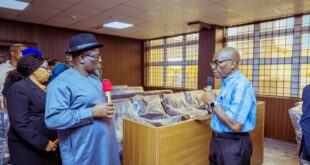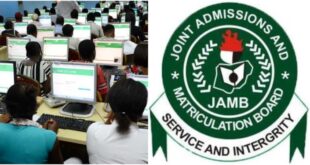By Shedrack Onitsha,
The Senator representing Delta central senatorial district, Senator Ovie Omo-Agege might have been vindicated following the ruling of the Federal High Court in Abuja on Wednesday that says the National Assembly could not amend the election timetable of INEC.
It will be recalled that last Month, 10 pro-Buhari Senators kicked against the new sequence of elections adopted by the apex legislative chamber, following amendment of the 2010 Electoral Act. Angered by what happened at the Senate chamber and while sitting was still on-going, 10 Senators of the All Progressives Congress, APC walked out on the Senate President, Senator Bukola Saraki while he was still presiding, went straight to the Senate Press Corps Centre to address Journalists, expressing their reservations and vehemently kicked against the bill.
According to them, the action of the Senate was not only a trash, but a rush, self-serving and targeted at the President Muhammadu Buhari’s re-election bid, adding that the amendment was carried out in very bad faith which will not stand.
ALSO READ: Urhobo the most beggarly tribe in Delta State -Chief Joe Omene
The 10 aggrieved Senators were led by Chairman of Northern Senators Caucus and former governor of Nasarawa State, Senator Abdullahi Adamu whose argument against the bill was truncated at the plenary session by Saraki. Other Senators that joined Senator Abdullahi Adamu in the protest were Abu Ibrahim (Katsina South); late Ali Wakil (Bauchi South); Abdullahi Gumel (Jigawa North West); Umar Kurfi (Katsina Central); Yahaya Abdullahi (Kebbi North); Binta Garba Masi (Adamawa North); Ovie Omo-Agege (Delta Central); Andrew Uchendu (Rivers East); and Benjamin Uwajimogu (Imo North).
Following the report of Senator Samuel Anyanwu, PDP; Imo East led Senate Committee on Ethics, Privileges and Public Petitions, the senate suspended Senator Ovie Omo- Agege, for ninety legislative days. Omo-Agege was also asked to withdraw his suit against the Senate from the court.
The Senate has also mandated that Parliamentary Support Group (Senate) for President Muhammadu Buhari must be disbanded immediately. Decisions of the Senate were subsequent to the report of Senator Samuel Anyanwu, PDP; Imo East led Senate Committee on Ethics, Privileges and Public Petitions which investigated the Senator.
However, the Federal High Court in Abuja has upheld the suit filed by Accord Party challenging the National Assembly’s re-ordering of the sequence of election which countered the time table released by the Independent National Electoral Commission (INEC).
Recall that both houses of the National Assembly had amended the Electoral Act bill had adopted a reordered sequence of the 2019 general election, putting the presidential election last.
The proposed sequence of elections would have made the national assembly election come first, followed by governorship and state houses of assembly, and presidential.
This is against the sequence rolled out by INEC, which put presidential and national assembly elections first, and governorship and state assembly to follow.
President Muhammadu Buhari refused to assent to the bill and returned it to the National Assembly because it violated some provisions of the constitution, but the House of Representatives and Senate threatened to invoke its powers under section 58(5) of the 1999 constitution to override the president.
Accord Party, through its counsel, Mr. Wole Olanipekun, its counsel, filed an application to stop the lawmakers from tampering with the electoral act.
Buhari notified the Senate about his action in a letter dated March 3, 2018, which was read by the President of the Senate, Dr Bukola Saraki during plenary.
The president said he withheld his assent to the bill because the amendment to the sequence of the elections in Section 25 of the Principal Act might infringe upon the constitutionally guaranteed discretion of INEC.
He stated that the section guaranteed the INEC to organise, undertake and supervise all the elections as provided in Section 15 (a) of the Third Schedule to the Constitution.
”The amendment to Section 138 of the Principal Act to delete two crucial grounds upon which an election may be challenged by candidates, unduly limits rights of candidates in elections to a free and fair electoral review process.
“The amendment to section 152 (325) of the Principal Act may raise constitutional issues over the competence of the National Assembly to legislate over Local Government elections.
Both houses last week dropped by bill, with the House of Representatives taking the lead.
The member of the House who initially sponsored the bill, Hon. Edward Pwajok, from Plateau, moved a motion to drop.
The senate also said it was re-considering the contentious provisions which the president snubbed.
The decision of the senate followed the debate on the bill which sought to further improve the electoral process as presented by the Chairman, Senate Committee on Independent National Electoral Commission (INEC), Sen. Suleiman Nazif at plenary.
Contributing, Sen. Kabiru Marafa (APC Zamfara) said the bill will further divide the Senate.
“It is unnecessary and we should not go to that. I don’t want us to finish the way we started,” he said.
Similarly, Senate Minority Leader, Sen. Godswill Akpabio said:”But my disagreement with the Bill is that we cannot probate and reprobate, as a Senate we are distinguished people and we must not speak with both sides of our mouth.
”The sequence that is proposed here is such that not only has it taken us backwards, it shows that we look confused,” Akpabio said.
In his remarks, the Deputy President of the Senate, Mr Ike Ekweremadu, who presided said it was important for all Senators “”to be on the same page in matters such as this.
”We passed the Electoral Act and then we sent it to the President, the President returned that Bill with a number of observations.
” One of the observations he made was in respect of order of election, he also made observation with regards to local government elections which the National Assembly was given power under that Bill to make laws.
”The President has made observations in respect of some aspects of that Bill; he did not say that the Bill we passed was entirely useless.
”To save those noble provisions in the Electoral Act, it is important that we remove all those areas that the President had objected to and pass the remaining items as a separate Bill and send it back to him.
”Then we can now deal with the issues where he has issues as a separate Bill altogether, and then we either defeat it or have it succeed.
”If it succeeds, we send it to the President, he decides what to do, if he brings it back, we also decide what to do.
”We need to clean up that Bill so that we will be able to save all those provisions that were already made in the elaborate bill,” Ekweremadu said.
Subscribe to the Advocate News letter and receive news updates daily in your inbox.
 Advocate.ng Latest news update on politics, entertainment, sport and more
Advocate.ng Latest news update on politics, entertainment, sport and more



